
“Here Comes Columbia”
A group of stubborn Ivy Leaguers, a quarter-miler jumping up to the half, and a finishing kick for the ages: an oral history of the 2007 Penn Relays 4x800 meters, and one of the biggest upsets in Penn history.
“We’ve got Kansas, Oral Roberts, Mississippi State, LSU, Michigan, Seton Hall, Georgetown, Villanova all in this mix. But it’s Columbia, in the light blue, leading.”
That’s what Mark Floreani, announcing for FloTrack, said on April 28, 2007, when Erison Hurtault handed me the baton with a five-meter lead in the Penn Relays College Men’s 4x800 Championship of America. Our first leg, Mike Mark, handed off in third before Jonah Rathbun kept us in the race through two exchanges, handing off in fourth. Then Erison unleashed an unruly kick, passing five runners on the final turn, and there we were: with two laps to go, Columbia University was in perfect position to win the 4x8 at Penn.
As noted by Floreani, who listed off eight other schools in tow, this wasn’t supposed to happen. Columbia hadn’t won a relay at Penn since 1938, and hadn’t won the 4x8 since 1933. No Ivy League school had won at the relays since 1974.
But there I was, leading the 4x8 in front of 46,363 spectators at Philadelphia’s Franklin Field. It didn’t last long — 200 meters into the race, Prince Mumba of defending champion Oral Roberts, who had run more than three seconds faster than me in the 800, sprinted past me and into the lead. I hung as tight as I could, but by the final turn, I had slipped to third behind Mumba and Michigan’s Andrew Ellerton, who had finished second in the 800 at the NCAA Indoor Championships a month earlier.
“This is a great last 150 it’s gonna turn out to be,” Floreani said as we rounded the turn. “Ellerton and Prince Mumba, and Columbia is holding on there in third. This is a great run for Columbia.”
It seemed like that would be the last time Floreani would mention Columbia — and why would he as the two stars battled for victory? With 70 meters to go, Ellerton inched past Mumba, and entering the home straight, it seemed like that was it. Ellerton was poised to sprint away from Mumba for the win.
“Ellerton is on the shoulder of Prince and it looks like Ellerton”—then Floreani stopped. Just then, I moved to the outside and shifted gears, passing Mumba and pulling up on Ellerton’s right shoulder. With 60 meters to the finish line, I was even with Ellerton.
Floreani couldn’t contain the surprise in his voice as he interrupted himself: “But here comes Columbia.'
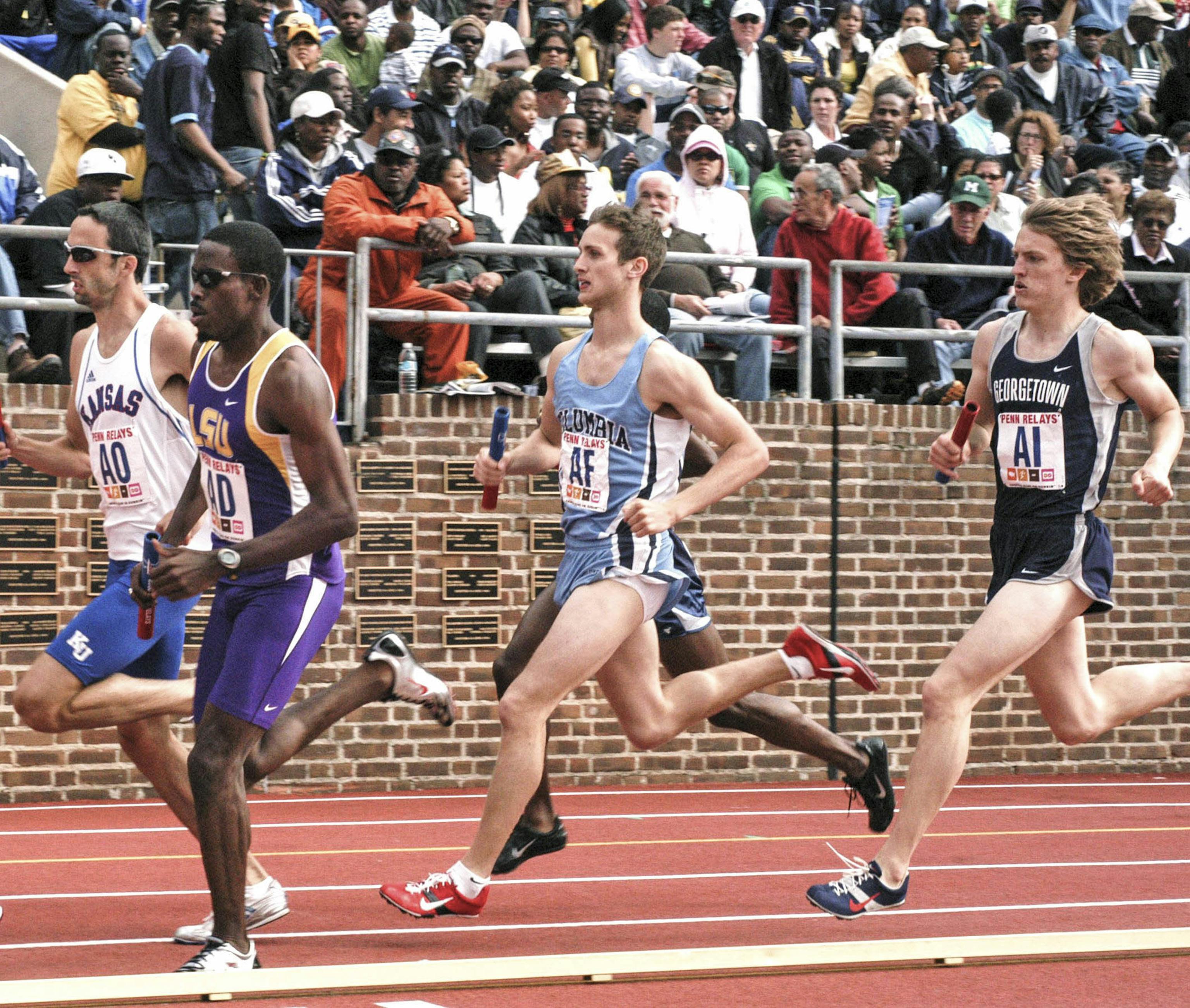
Ten years ago, Columbia won the 4x800 at Penn, delivering a shocking title to a school desperate for a win on the national stage. I spoke with my teammates, coaches, and others from that day for this oral history — everyone is listed with a short description of their connection to the race. Together, we’ll tell the story of the 2007 Penn Relays 4x8, and one of the biggest upsets in the history of the Relay Carnival.
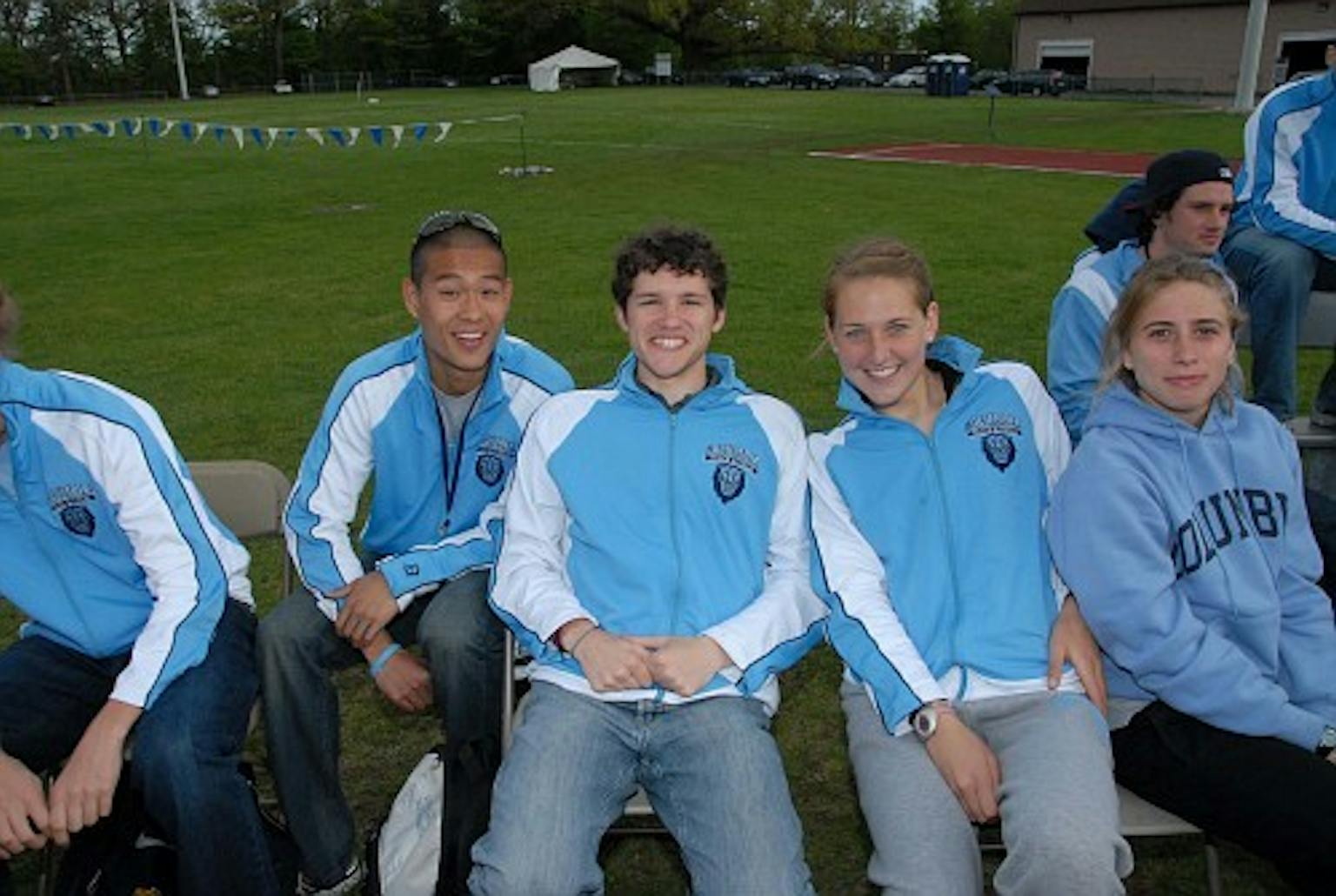
'The writing was on the wall.'
When Willy Wood took over as the Columbia University head coach in 1994, there wasn’t anywhere to go but up. The team was shut out at Heps (the Ivy League Championships) in both 1989 and ’90, and hadn’t won a title in cross-country since 1979 — the school’s only win. Turning the cross-country program around became Wood’s main objective. By 1998, Columbia finished third at Heps, and after taking second in 2002 and 2003, finally won in 2004. The next goal? Building a middle-distance program.
Willy Wood (Head coach, Columbia Track and Field):
When I got to Columbia, we had 12 to 15 guys on the team. We had no matching uniforms, no warmups — we had absolutely nothing.
I came in so enthusiastically and told every recruit that we were going to change the world at a place where everybody says it’s impossible. The number one priority was recruiting someone who could help us win Heps cross-country. When I first got there, Princeton was getting the top five guys, so we took the next 15 and decided we were going to outwork everyone. They all came in with a chip on their shoulder.
It took some time, but once we got good enough in cross-country, we started targeting 800 runners, too.
Chris Miltenberg (Assistant coach, Columbia Track and Field):
Willy had the cross-country thing going when I got there, but we wanted to do some really good middle-distance running, too. Liam, Jonah, John Heistand, and Zach Richard were coming in as freshmen, and one of the first things we were thinking was: This group of guys, we can have a team that can win at Penn in the 4x8 or Distance Medley Relay and be as good as anyone in the country.
Wood:
You win a small wheel when you win a college section [the slow heat] at Penn Relays, and we had done that a few times. It was always a big win for us. But there was a hope we’d stick our nose in a Championship of America race for a big wheel one day.
Liam Boylan-Pett (Anchor leg, Columbia 4x800, and author of story):
One of my first weeks on campus Coach Wood told me that if we won at Penn Relays, Columbia would be on the cover of Sports Illustrated. Penn was on my mind early, even if Wood was kind of joking.
I ran the 800 in 1:51 in high school, so I thought it was only a matter of time before I was running 1:48. Then my freshman year happened.
I was awful. I strained a thigh muscle the week of indoor Heps and didn’t make the final of the 1K, then never let the muscle heal and didn’t race outdoors. Things didn’t get better the next year. I got a stress fracture in my left foot during cross-country my sophomore year and thought about transferring.
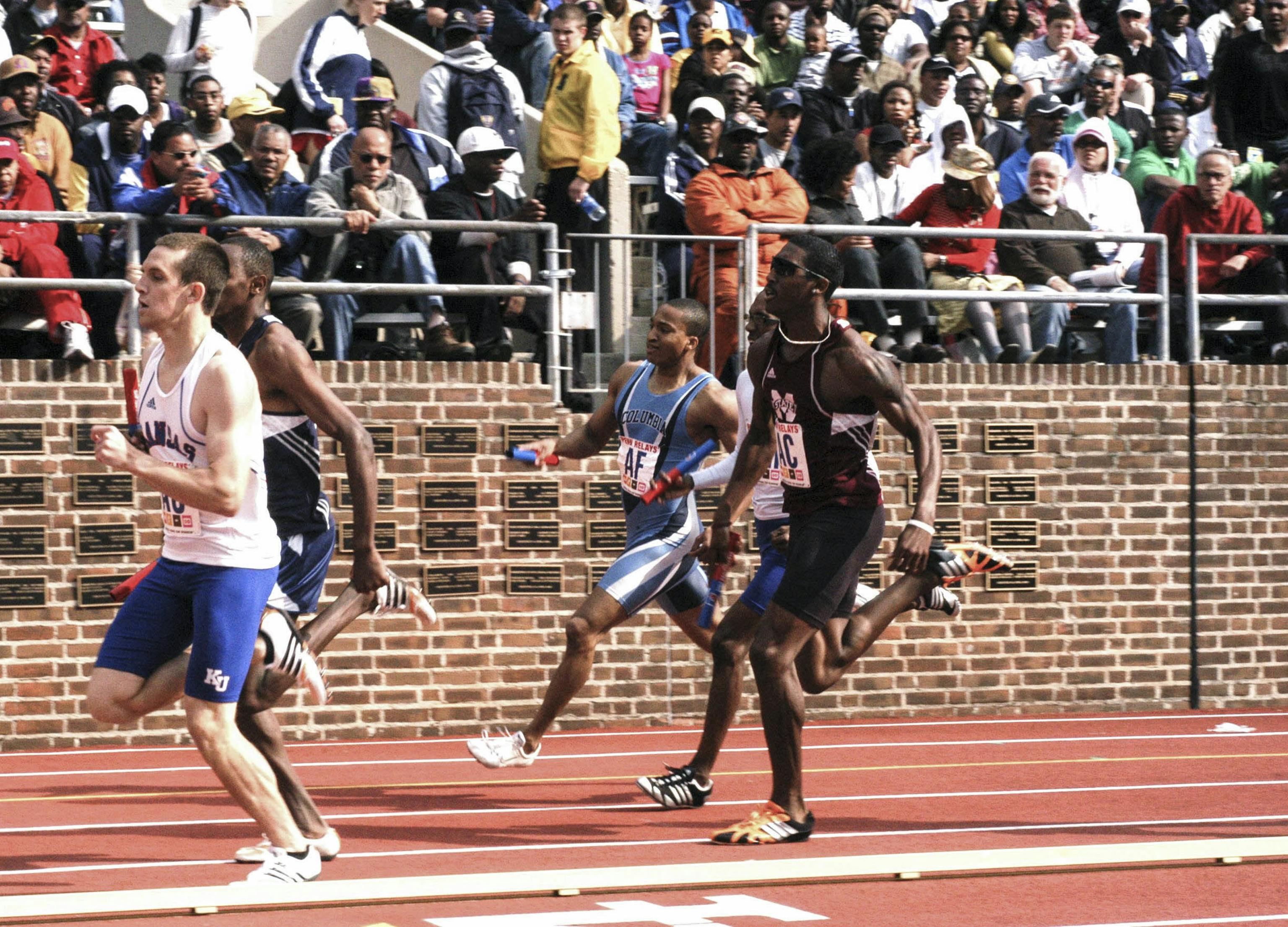
Miltenberg:
I’ll admit there were some down points. Guys didn’t develop the way we thought they would right away and all that Penn talk might have been a little much. But we kept at it, and things eventually started to click indoors in 2006.
Liam:
I got healthy, and our training group started to focus. We had gotten too relaxed, and we got sick of not being very good. Brian Horneck and Kent Collins were juniors, and they kind of took over. They started training like animals, and we had no choice but to go with them or leave the team. Kent was a 1:55 guy in high school, but he took the Mid-D program and made us believe we could be something. There was no let-up. We were all go all the time. And we finally started running well.
Miltenberg:
Jumping ahead to Penn Relays 2006, though, that’s when the writing was on the wall.
Jonah Rathbun (Second leg, Columbia 4x800):
We were in the paddock before the 4x8 at Penn my sophomore year, and they told us we were in the second heat. It was Horneck, Zach, Liam, and I, and we were pissed.
Liam:
Then Coach Wood came up to the paddock and started yelling at the officials to get us into the fast heat.
Jonah:
The official yelled back at him, “You want to take last in the fast heat?” Coach Wood said, “Yes, we want to take last in the fast heat.” Then we took sixth.
Liam:
We ran 7:25 and broke the school record, but we ran with schools like Penn State and beat Georgetown. Looking back on it, we were seven seconds back of Oral Roberts, but at the time, we thought we were legit.
Jonah:
Wood sticking his neck out for us was huge. The fast heat in 2007 would have been so overwhelming if we hadn’t been in the fast heat the year before.
Miltenberg:
Even if we weren’t in the mix for the win, I was jacked with how we competed. One more year, I thought, and we could really do this.
Wood:
It was the first time we thought we were equally as good as all these people. If things played out in the right way, this could happen.
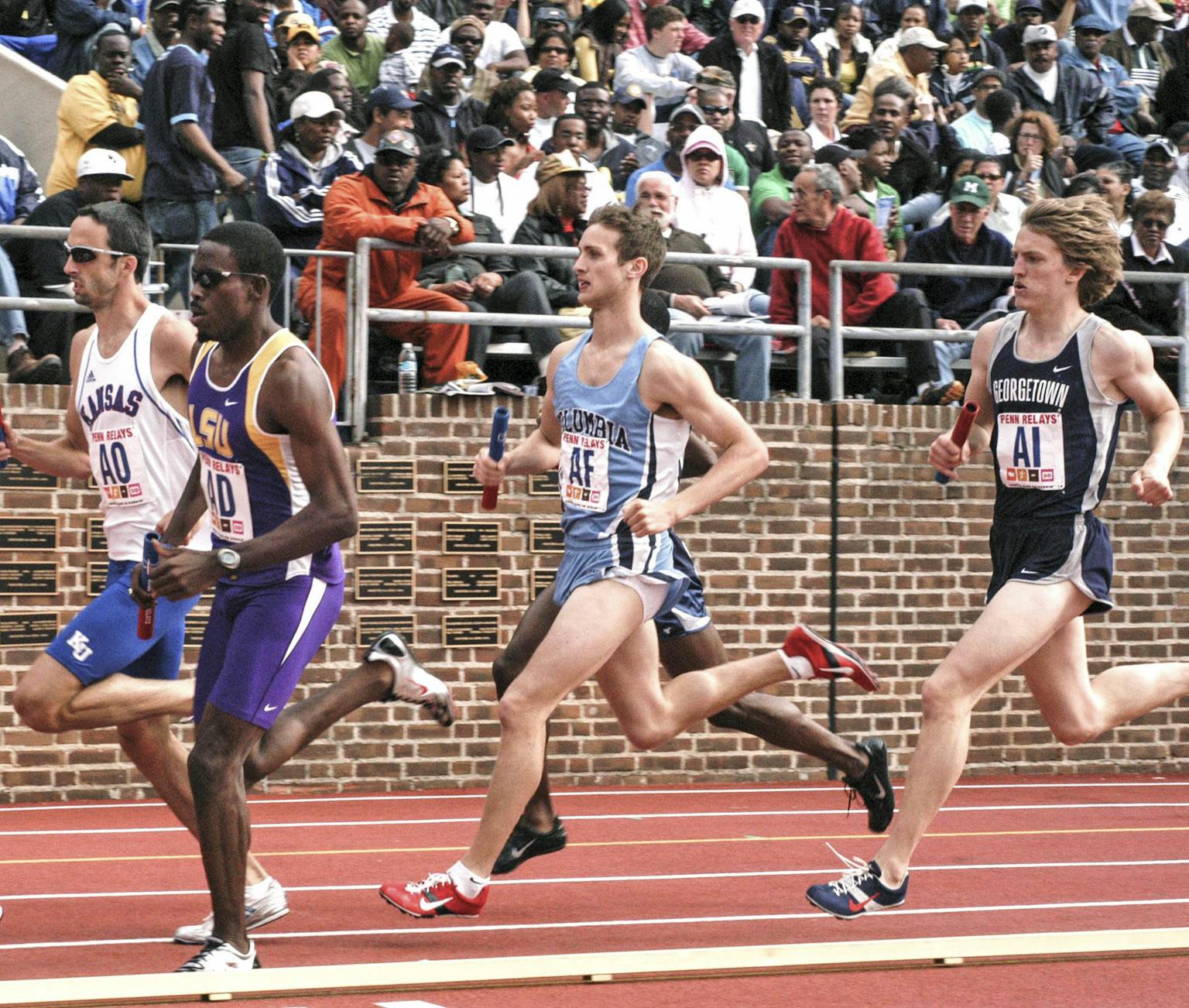
“I guarantee he can do this.”
Heading into the 2007 outdoor track season, Penn Relays was circled on the calendar. Boylan-Pett had won the mile at indoor Heps, and freshman Mike Mark had established himself as one of the Ivy League’s best freshman. Plus, Wood had a surprise up his sleeve. Senior Erison Hurtault, who finished fourth at the NCAA Indoor Championships in the 400 meters and was already one of the greatest runners in Ivy League history, had the strength to run an 800.
Wood:
I wasn’t recruiting sprinters in the early 2000s, but Erison was different. He ran 48.8 in high school for the 400, but I saw him at the Armory, and you could tell he was not a 48.8 guy. He split 48 that day but was all over the track, running up behind guys and then out into lane three. It was equally impressive and unimpressive. You saw him and there was no way you can’t have this kid.
Miltenberg:
Erison was big time in the 400, but Willy had been saying all year, “I guarantee he can do this.” The key is, he can’t do it too many times, because then he’s going to start thinking about it. From the beginning of the year, the plan was to put Erison into an 800 at George Mason, then bam, run him in the second one at Penn. Not that we were going to talk about it. Naiveté was a good thing for Erison in the 800.
Erison Hurtault (Third leg, Columbia 4x800):
Wood would always start me with strength stuff on the track, and then I’d get to speed work. So I would run an 800 early, but then we would go back to doing 400 training.
Wood:
Erison ran 1:51.69 and beat Liam at George Mason. That was exactly when I knew this was it. If we put him on this 4x8, there’s a chance we could do something special.
Erison:
I thought that would be it for 800s. Over the next month, I didn’t run anything over a 300 in workouts.
Liam:
I was pissed he beat me. I was doubling back from the 1500 a few hours earlier, but I didn’t think I should be losing to Erison in the 800, no matter how good he was. But I also knew what it meant for the 4x8. There was a month until Penn.
Miltenberg:
Then we ran an 800 at Long Beach State two weeks out. Liam won and PR’d in 1:50.6 and Jonah and Mike both ran 1:51-mid.
Liam:
We thought we were ready — even though we probably shouldn’t have. Adding up our PRs got us to a 7:24.74, but it took sub-7:20 to win the year before. It’s a good thing nobody told us we weren’t actually that good.
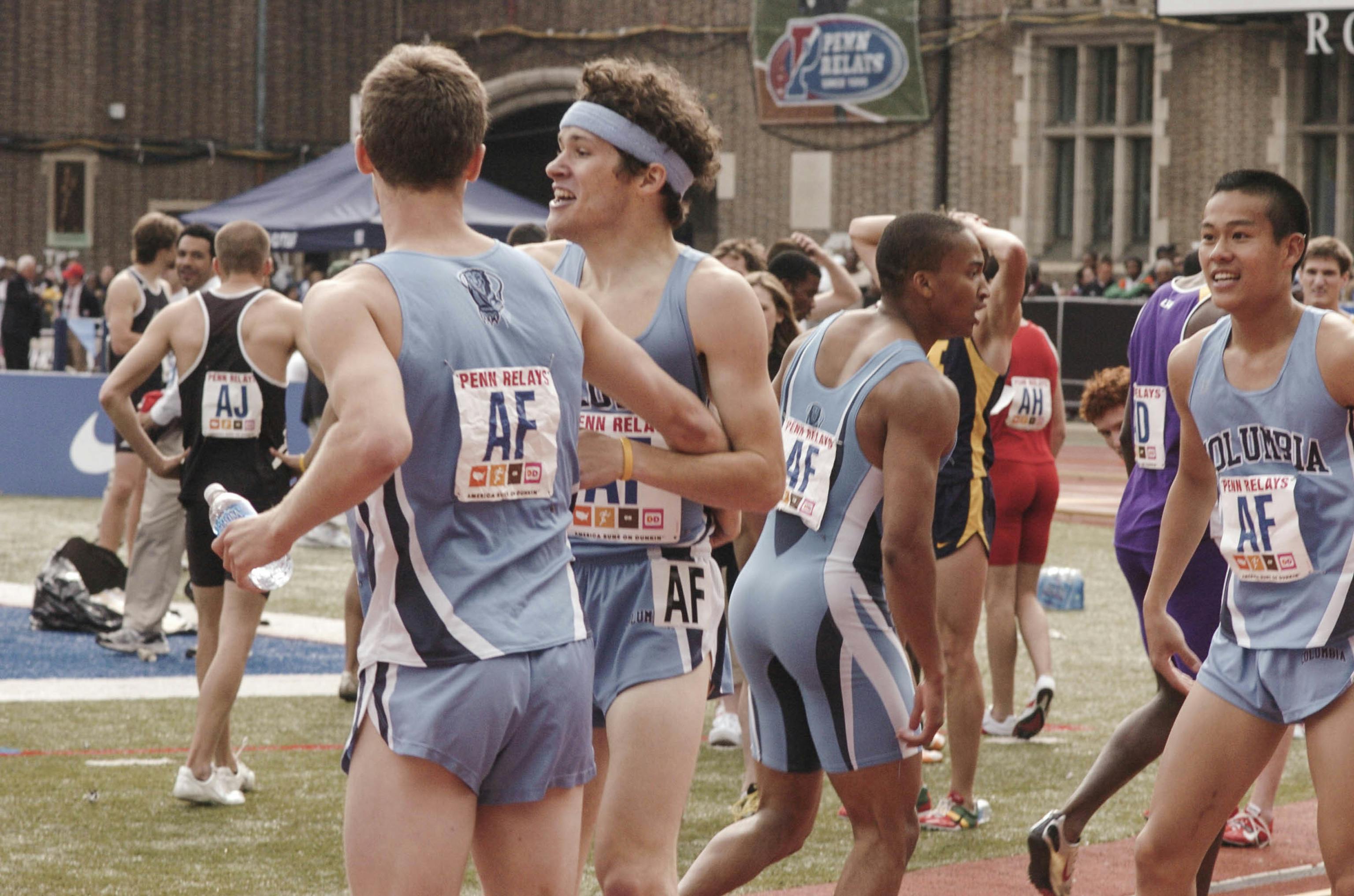
The team had two weeks between the west coast trip and Penn Relays. Hurtault thought he’d be the 400 leg on the DMR on Friday at Penn, but Wood had different plans.
Erison:
I found out that week I was running the 4x8. I said, “You’re sure I’m running the four by 800?” I knew we were stacking it, and I didn’t know if I was the most logical choice because I had been away from the 800 for so long.
Wood:
The hardest part was leaving Kent off the team. We were taking off the heart and soul of the team. And it wasn’t just me. Erison came into my office like Rudy. He said, “Do you think we can honestly win? Because if we can’t I don’t want to take Kent off the team.”
And I did think we could. If Mark and Rathbun can keep us remotely close, then with Erison and Liam closing you’ve got a shot.
Liam:
I had my doubts, too. The Wednesday before the race I told Coach Wood I thought Erison should be the anchor. He had beaten me at George Mason, and I was getting those pre-race doubts that always seem to come around.
Miltenberg:
We had talked about it. We wanted to hide Erison somewhat. What if Liam handed off in the lead and Erison went out in 50 point?
Wood:
I told Liam he was our guy. The way he was closing races, it was our best chance to win. I told him he was our anchor, and that was it.
Liam:
There was no secret coaching lesson in it, he was just straight forward with me. And I accepted it — I kind of had to.
Erison:
I was just making sure Wood had given it some good thought. Once we talked about it, I trusted him.
Miltenberg:
There was just a good vibe that week. We had a freshman and a 400 guy on the team, but when you have a guy like Erison in the van, that changes things completely. He’s so quietly confident. He didn’t care if the guy was from an SEC school, he just put himself in it. He carried himself that way. There was a confidence and positivity in the lead up to the race that’s hard to explain.
Liam:
For some reason, the group just wasn’t that nervous. Knowing that no one other than ourselves thought we had a chance to win probably helped with that.
Miltenberg:
Wood and I definitely thought we had a shot at winning, and we had guys that believed we could do it, even though there wasn’t a lot on paper saying that we could. At the same time, though, we thought there were five or six other teams that had a shot as well.
Mike Mark (First leg, Columbia 4x800):
In the hotel the night before the race, I asked Jonah what percent chance we had to win. He said 10, and I remember thinking, OK, that’s not too bad.
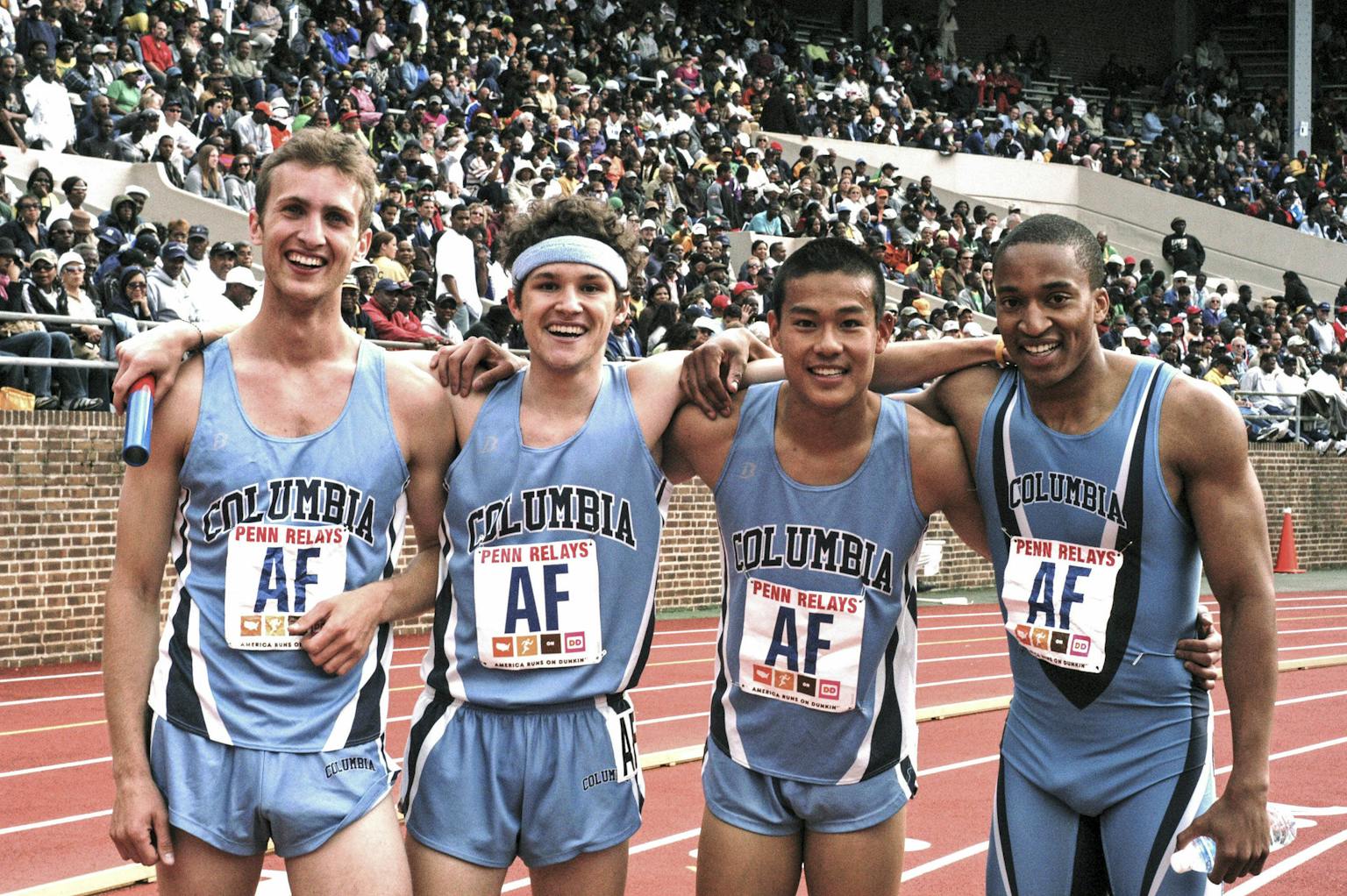
“Columbia? Columbia. Columbiaaaaa!”
Columbia went into the race with confidence, but would be facing off against Oral Roberts, who had won the year before and had Shaun Smith and Prince Mumba returning. They warmed up before entering the paddock at Penn, a spot where they hoard runners before letting them out onto the track for the race. Their race bib, AF, signified their sixth seed in the race. Oral Roberts wore AA.
Robert Hersh (Penn Relays announcer, Columbia Class of 1960):
I was the team manager for Columbia track in the 1950s. I still think it, but track and field was the greatest sport in the world to me then. After graduating, I always paid attention to the Columbia team, and I stayed very involved with the sport of track and field. I announced track meets for 35 years, including six Olympics, nine world championships, and every other meet you could think of. On that day at Penn, I was in the announcer’s booth about a dozen rows up from the finish line, calling the meet over the stadium loudspeakers.
When they came on the track, I knew from the fact that Columbia had a good letter — we were F — that we had a solid team. I had no expectation, however, that we could win. I don’t know whether the coach did, but I was looking forward to the race because I knew at the very least we would be competitive. Which wasn’t often the case.
Wood:
I went to the top of the stands. I didn’t want to be near anyone.
Miltenberg:
I was on the backstretch with about 250 meters to go, close to the track.
Mike:
I don’t think I understood how that big this was for us. In high school, we raced at Penn, but it’s not at the same level — the stakes aren’t as high.
Liam:
I was still in the paddock with Erison when they sent Mike and Jonah onto the track. Only the first two legs got to go out. Things move so quickly once you’re in the paddock that you don’t really have time to think about anything.
Mike:
Wood kept telling me that I needed to get out really hard. So I did.
Wood:
The gun goes off, and Mike gets out perfectly. He’s just off the leader.
Miltenberg:
Mike Mark, a Columbia freshman, didn’t hesitate. He got right to the shoulder of the leader. He did exactly what we needed him to do.
Wood:
Just keep us in it and give us a chance, I kept thinking. Don’t try do anything heroic. And he exceeded my expectations. He stayed right in the pocket of the leader, no matter who took over.
Hersh:
From the very first lap, Columbia ran tactically beautifully. They would get out well, then settle in. They mostly stayed close to the rail.
Miltenberg:
Mike stuck with it, closing well, and handed off in third. We were just behind LSU and Seton Hall. Oral Roberts handed off behind us, but not far back.
Jonah:
Mike hands me the baton and we’re just little bit back of LSU and Seton Hall. I’m racing against Jamaal James and Shaun Smith — he’s the guy who ran 1:45 the year before to break the race open. But he’s not up on me yet.
Wood:
Jonah looked so good and it was unbelievable. I was really starting to think we had a shot to do this. Then he took the lead at 400 meters and my heart sank.
Jonah:
The pack started to bunch up, and I didn’t even think about passing, I just thought we were going really slow. I thought I should go by him, so I did. And as soon as I did it I was in the lead and I was like, “Well this is gonna suck.”
Wood:
I was worried, but he honestly bounced back so well. Oral Roberts went by him eventually, but they weren’t blowing the race open like they did the year before.
Jonah:
I just gotta keep going. They all started to go with 200 to go and I was pretty cashed, I just knew I had to get it to Erison in some form reasonably close.
Liam:
I was out on the track and saw Jonah charging home in fourth. He was dead, but we were still in it — especially with Erison.
Wood:
We were five yards back. Then we got a gift.
Jonah:
Erison takes the baton, and then whoever was in the lead just slammed on the breaks.
Mike:
The Oral Roberts leg started jogging. Everyone got back into it.
Wood:
That’s when I knew. We actually had a shot. They went out in 57. To me, this is perfect, this is how stuff happens.
Erison:
Coming through the 400, I was boxed in, but I wasn’t out of it. I remember coming through the quarter, I was hearing splits, they said, 56, 57.
Mike:
After the race, I asked Erison what he was thinking coming through the 400, and verbatim, he said, “Oh these cats are in trouble.”
Erison:
I’m a 400 runner. You have no idea, I was jogging.
Wood:
I was sitting behind two kids who ran for Penn and they didn’t know who I was. They couldn’t believe that we put Erison on the third leg. He dropped back from 500 to 600, going from about third to eighth and these kids were saying, “I told you.” Then, right as they’re finishing their sentence, Erison went.
Liam:
The way they set up the exchange zones, the team that’s in first is closest to the rail and then it goes up from there. I was eighth up from the rail with 200 to go in Erison’s leg. Then he just goes. He passed seven guys in about 10 steps around the curve, and I walked straight to the rail. I wasn’t able to appreciate it at the time, but it was honestly one of the most impressive things I’ve seen on a track. He made those guys look like they were standing still.
Wood:
Those two Penn kids went nuts. To their credit, they didn’t care they were wrong. Erison just embarrassed everyone.
Liam:
He gave me the baton with a big lead, and there I was, in first at Penn Relays. One thing, though: I hated running with the lead.
Miltenberg:
Liam was way better when he was the hunter. Indoors, outdoors, he was finishing stuff really well. Being in the lead wasn’t exactly ideal.
Jonah:
If you win at Penn, each person on the team gets a gold watch. Somewhere along the line, though, we found out that the top East Coast team got one, too. So you could get a watch if you were fourth, as long as you beat all the other East teams. Liam was in the lead, with Oral Roberts and Mississippi State behind him, and I was jumping up and down. We could get third or fourth — and that would probably mean a watch.
Erison:
I was dead. But I found Jonah and Mike on the infield. Jonah was watching so intently, talking about the watch, and I was like, Okay, maybe we’ll get one.
Jonah:
Liam’s in first right now. He’s probably going to get passed by two, but definitely not three people.
Liam:
Prince Mumba passed me 200 meters into the race.
Erison:
It’s got to be intimidating getting passed by a 1:46 guy.
Miltenberg:
LSU went by him, too. That was the best thing that happened — I was so relieved when those guys passed him right away. And he stayed right there. He wouldn’t give them an inch.
Wood:
I knew the field was ridiculously good, so I was guarded, but without a doubt, the way Liam raced I knew we had a shot. He came through 400 in 53 point, which wasn’t overly fast for him. When he came through, I thought he could kick with anyone.
Liam:
I clipped the rail with 300 to go and felt Ellerton come up, but I was still in third and remember thinking, “Just stay close. Just stay close.”
Miltenberg:
Liam was tucked in with 250 to go, but if there’s one thing that he was good at, it was getting to the right spot. Then he beat LSU to the corner heading into the last turn, and it was just Oral Roberts and Michigan in front of us.
Jonah:
Liam got passed, then got passed again, and I’m like don’t get passed again. We were in third with 150 to go. This was happening. We were going to get a watch.
Wood:
At that point, they got a little distance on us on the curve and I thought, no matter what happens, I felt like for the first time Columbia had made it on the national stage. If nothing else, we were in the mix, and it was going to be respectful. We were going to run fast and mix it up and they only barely gapped us. But then you could tell at about 120 that he found a gear.
Jonah:
And then the announcer…
Erison:
I was dead. I had been lying down. I’ll admit I wasn’t even watching the race. Then I heard the announcer. I bounced up immediately.
Hersh:
As the race unfolded, I was very pleased to see Columbia was right in the middle of it — right in the hunt. Then the homestretch and the conclusion just blew me away. I was on the loudspeaker and when we pulled even. I couldn’t believe it. I said, “Columbia?”
Liam:
All around the turn I stayed close. Then, we were about to hit the homestretch, and I got to the outside.
Wood:
Liam swung wide and this was actually it. I thought multiple times that we had a shot, but I was always guarded. I always downplayed expectations. But right then. Liam swung wide and pulled even. It was really there. Oh my god it’s really going to happen.
Liam:
The track straightened out and I saw it. I was even and I wasn’t letting up. I thought, “Holy shit we’re going to win.” All down the final 60 meters I kept saying, “This is happening, this is happening.”
Hersh:
Columbia pulled ahead and I said, “Columbia!”
Liam:
In my memory of it, I’m peering around myself and seeing myself pull even with Michigan. Then I’m pulling ahead. Then I got there. I actually got to the finish line first.
Hersh:
I couldn’t contain my excitement, “Columbiaaaaaaa!”
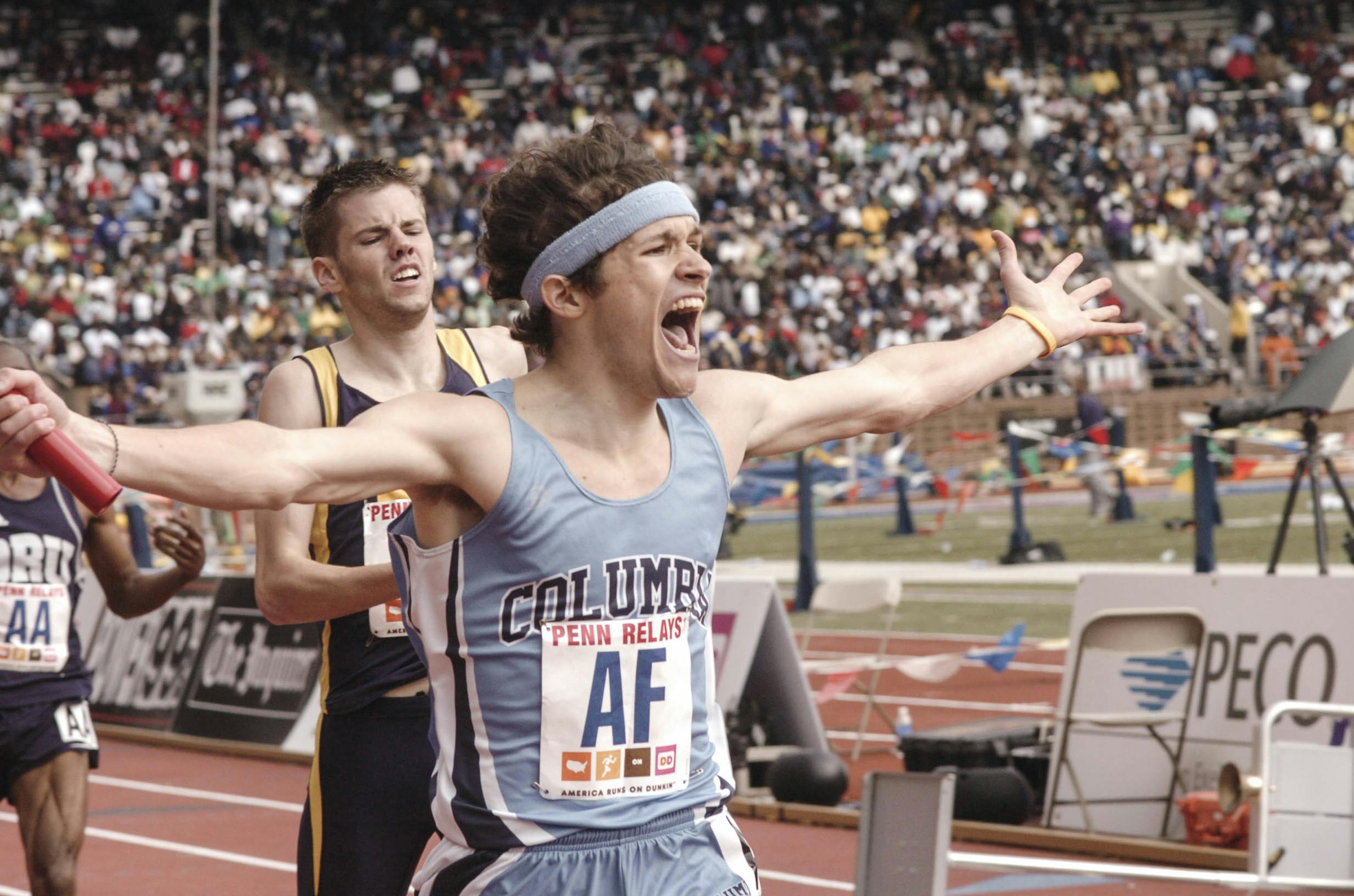
“I didn’t win too many races in college. That was one of the few.”
Boylan-Pett crossed the line in first ahead of Michigan’s Andrew Ellerton, giving Columbia the win in a school record of 7:22.64, just a tenth of a second in front of Michigan.
Jonah:
Liam put his arms out as soon as he crossed the line.
Liam:
I didn’t stop running. I went straight to Erison, Jonah, and Mike.
Jonah:
Mike was bounding around. Erison shot up for the group hug. It was kind of a standing dog pile with us all yelling, “Oh my god, oh my god.”
Erison:
I was still dead.
Mike:
Erison kept trying to stop on the victory lap.
Hersh:
In a way, I wish I was not on the microphone because all I wanted to do was jump up and down and start screaming. But I couldn’t go nuts because I had a job to do. Immediately, I’m making hand signals with my friends a few rows ahead, scrambling to do what I needed to do, which was to figure out when’s the last time Columbia won a race. What about the 4x8? What about an Ivy League team? All of these things, if I had thought those were possibilities before the meet, I might have researched it then.
Wood:
I stayed in my seat for a while. I missed the victory lap, missed the whole thing. I was trying to walk down and find the guys, but every high school coach was stopping me. I don’t think I’ve ever seen a race where the whole place cared. People were legit happy that we won, we gave everyone hope that they could do it too.
Miltenberg:
I saw them on the victory lap. I didn’t even have anything to say. I remember it clearly. I told them later, “What makes that so special is you did it with three other guys. That’s one of the defining moments of each of their careers, because it’s about a team. You do some great stuff on the track, but you rarely get that team feeling.” But right then, I just kind of shrugged.
Liam:
It didn’t stop with the victory lap. We had a press conference. I said “Columbia doesn’t win much of anything,” and that’s what the Philly paper led their story with. Coach Milt told me people in the athletic department weren’t too happy with that.
Erison:
We were walking back to the van and people were congratulating us on the way. Wood said we were messing up so badly by leaving Penn and Philly. We should have stayed to celebrate.
Jonah:
I smiled the whole way home.
The days after the race were filled with congratulatory text messages and emails. Plus, endless replays of the race on FloTrack.
Wood:
It would have been a slightly different experience if it had been a year or two earlier. It was a more global experience because people saw it on FloTrack within 24 hours.
Jonah:
I watched the race about a thousand times afterwards, just like over and over and over.
Erison:
Watching that video, we spotted the Mississippi State guy. He was in second behind Liam on the anchor leg, and ran right up behind him. You can barely see it in the video, but he points the baton at Liam, then makes a throat slash gesture.
Liam:
I would have quit immediately if I would have known that was happening behind me.
Jonah:
Yeah, but he ended up taking like eighth.
Liam:
I still watch the video more than I’d like to admit — not for the throat slash, for the finish.
Mike:
I think about the race more than you would think.
Erison:
Any times Penn comes up, I do.
Jonah:
Any time anyone brings up running I think about it. It was the highlight of my career. I didn’t win too many races in college. That was one of the few.
Miltenberg:
Columbia hadn’t fully broken through yet. No team was going to nationals in cross-country. They didn’t have Kyle Merber there running 3:35 in the 1500. This was the first big national recognition of what Wood had been building since 1994. It was very emotional — that group of guys. That was why I got into coaching.
Liam:
We didn’t make the cover of Sports Illustrated like Wood said we would, but the inside cover of Track & Field News was pretty cool.
That race was the highlight of my career. I ended up breaking 4:00 in the mile, which was the amazing experience you’d expect it to be. But the 4x8… I still smile whenever I think about it.
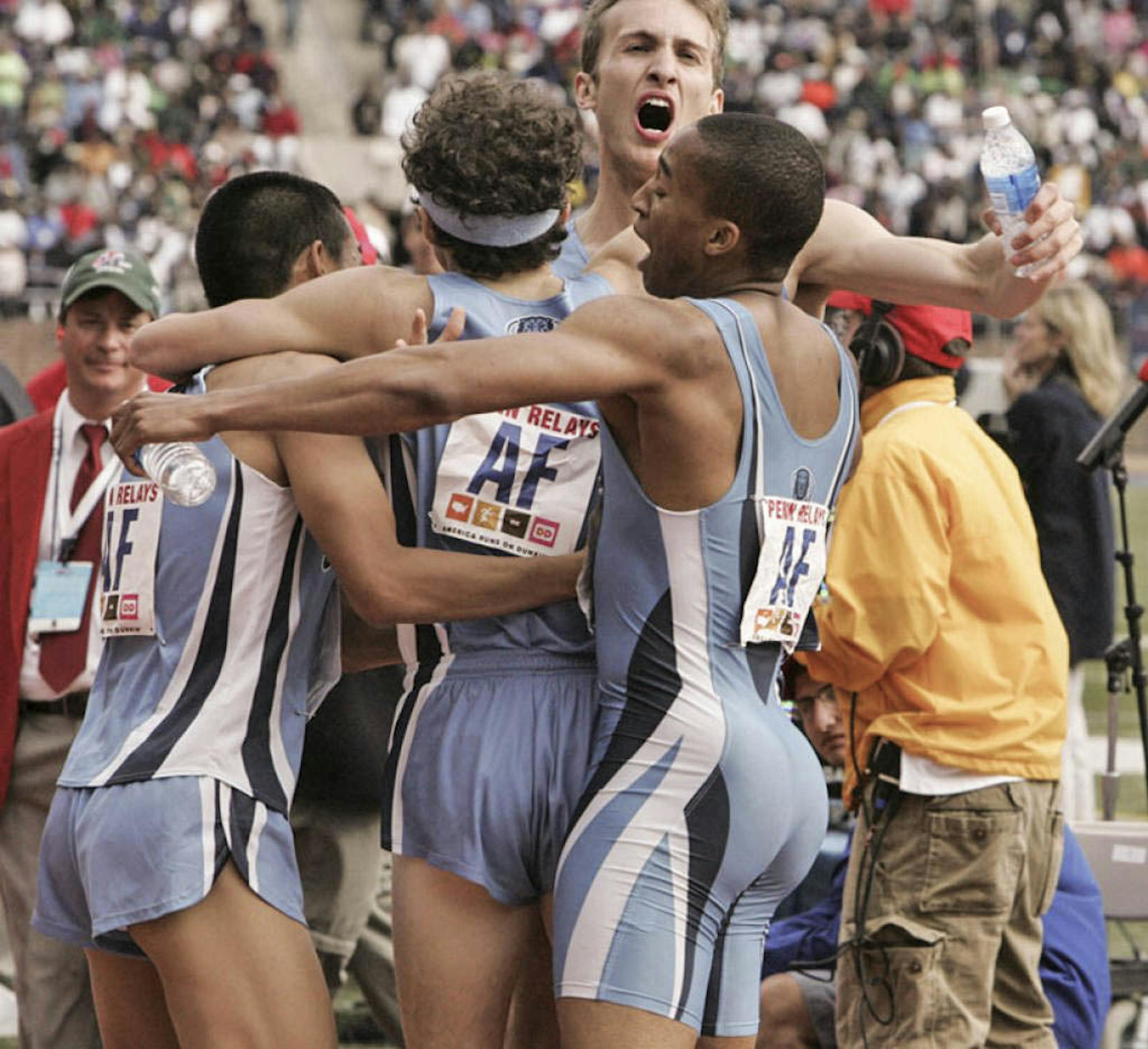
Afterword
Erison Hurtault would go on to finish third at the NCAA Championships in the 400 meters that year, running 45.40 to set a still-standing school record. He would then run for Dominica in both the 2008 and 2012 Olympics. He retired from professional running in 2016 and now coaches the track team at New York University.
Liam Boylan-Pett would go on to run 3:57 in the mile and run at the 2012 Olympic Trials in the 800 and 1500 meters. He retired from professional running in 2016. He now works for an ad agency and is a freelance journalist.
Mike Mark finished his three more years at Columbia and now works in finance in New York.
Jonah Rathbun stopped running competitively after his Columbia career. He now works in finance in New York.
Chris Miltenberg coached the Georgetown women’s team to an NCAA cross-country championship and is currently the head coach of Stanford track and field.
Willy Wood left Columbia in 2014 and is the founder of FastTrackRecruiting.
Robert Hersh stopped announcing track meets in 2008. He says Columbia winning the 4x800 at Penn is the most exciting thing he ever saw on a track. The background of his computer screen is the image of Boylan-Pett crossing the line in first.
Ten years later, they still grin ear-to-ear when they think about the 4x8, and one of the greatest races they ever ran.
Written by Liam Boylan-Pett.